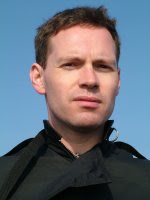I'm an avid reader of crime stories, from the heavy procedural fare like Patricia Cornwell's Scarpetta series to the easier reads of James Patterson's Alex Cross and Women's Murder Club novels.
Equally I love a good yarn on television, whether the alien-conspiracy laden X-Files or the more gritty series like the BBC's Messiah, the original of which was based on Boris Starling's excellent book, and the fifth instalment airing this coming weekend.
What fascinates me most about these stories is how the detectives track down the bad guys, what techniques and methods they use, how they spot the inevitable mistake that the killer makes, and how they prove the who, what, why, when and how of everything.
It does make me wonder, though, whether the rise in popularity of shows like CSI, whether it be New York, Miami, Las Vegas or Barrow-on-Furness, and the reading public's thirst for Cornwell and Patterson (who incidentally seems to be the most prolific author in the history of literature, putting out a new hardcover every six weeks or so thanks to his unique methods of collaboration) is not only entertaining us, but also providing a crash course in 'how to get away with it' for the ne'er do wells out there.
Case in point, I've just finished the latest Patterson offering, 7th Heaven (the seventh book in his insanely popular Women's Murder Club series), and thanks to the descriptions of how they investigate arson, together with the revelations of just how the perpetrator (don't worry, I won't give anything away) managed to get away with their crimes for so long, I know exactly which mistakes not to make, and how to avoid leaving evidence should I ever decide to go on an arson spree of my own.
Twenty or thirty years ago, it wasn't common knowledge (thanks largely to there being much less television available for consumption) that you could avoid leaving fingerprints by wearing gloves, or that traces of your DNA could be left at crime scenes that, years later, could be used to prove that you-dunnit.
Thanks to all of the crime books I've read, both fictional, and non-fictional, including those by the likes of Robert Ressler, the FBI agent who invented the term 'serial killer' and was the basis for the character of Clarice Starling in Thomas Harris's The Silence Of The Lambs, I feel confident that should I decide to chuck it all in one day and become a criminal, then I'd have a good headstart in avoiding the authorities, and could conceivably get away with my crimes until the day I died.
In fact, who's to say that there aren't people out there, who thanks to their intensive training via the written word and television screen, have actually committed 'the perfect crime'? We'll never know, of course, because then it wouldn't be perfect.
Makes you think though, doesn't it?
Friday, 18 January 2008
Subscribe to:
Post Comments (Atom)

No comments:
Post a Comment